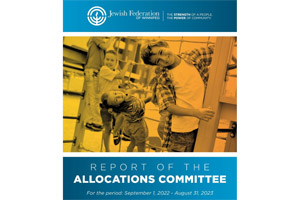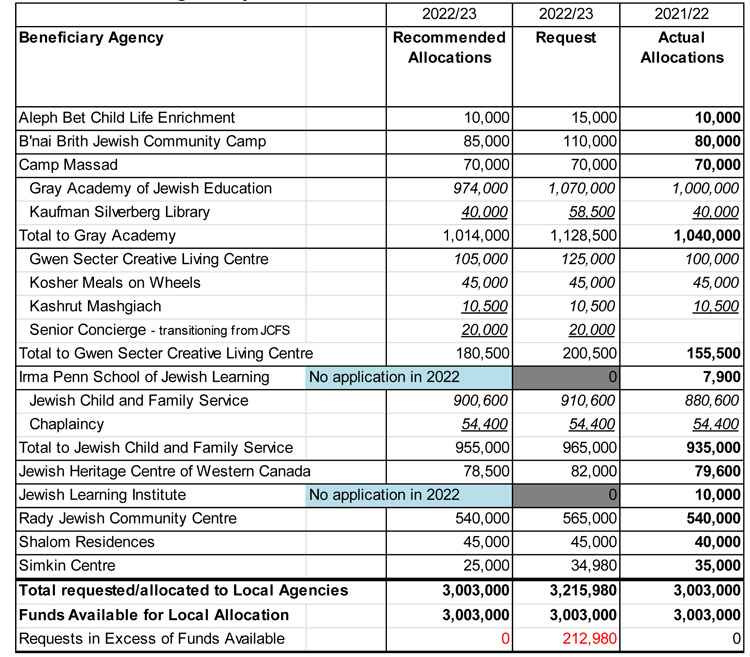Local News
Some major changes in allocations to beneficiary agencies of the Jewish Federation as of Sept. 1 – Gray Academy to receive $26,000 less than last year
 By BERNIE BELLAN The Jewish Federation will be allocating exactly the same total amount of money to its beneficiary agencies in the 2022/23 fiscal year (beginning September 1) as it did in 2021/22: $3,003,000. But – the distribution of those funds will be markedly different this coming year than it was in the fiscal year that will end August 31.
By BERNIE BELLAN The Jewish Federation will be allocating exactly the same total amount of money to its beneficiary agencies in the 2022/23 fiscal year (beginning September 1) as it did in 2021/22: $3,003,000. But – the distribution of those funds will be markedly different this coming year than it was in the fiscal year that will end August 31.
That is the major takeaway from this year’s report of the Federation’s Budget & Allocations Committee.

Of its 12 beneficiary agencies, moreover, two will not be operating at all this coming year and are, therefore, not being funded: The Irma Penn School of Jewish Learning (“which lost their newly recruited teacher just before the school year began and was not able to find a replacement mid-year”) and the Jewish Learning Institute (which “is finishing the current season with remote programming but will have to resolve staffing before establishing what the program will look like going forward.”)
Of the remaining ten agencies, the most notable changes will be occurring in: funding for the Gray Academy, which will see a drop of $26,000 in its allocation; a $10,000 drop in allocation for the Simkin Centre; a $5,000 increase for the Gwen Secter Centre (along with the transfer of the “senior concierge” position to Gwen Secter from Jewish Child & Family Service); and a $20,000 increase in allocation for JCFS.
The continued effects of the Covid pandemic have made planning much more difficult for many of the agencies.
In a section of the report titled “Beneficiary Agencies Highlights and Needs,” the Allocations Committee enumerated the many challenges facing the agencies in general:
“Pandemic Recoveries and Overall Trends: The Winnipeg Jewish community benefits from strong Beneficiaries that found creative ways to serve their constituencies in the face of restrictions on service, safety and health concerns. They are all budgeting and planning for more ‘normal’ years of service in the next year. However, each agency has a Plan A and a Plan B and a variety of scenarios that are on their radar, having learned to expect uncertainty. Every agency expressed cautious optimism about the year to come as well as concerns:
• Concern about inflation and rising supply costs, specifically food, gas, and biodegradable packaging;
• Each agency is coming into the next year in a good financial position, some with significant surpluses because of government subsidies and foundation grants during the pandemic, fortunate but not likely to repeat;
• There continue to be some additional costs associated with fewer people allowed in the same spaces, hybrid/online service costs, heightened attention to cleaning, etc.;
• Several agencies mentioned wanting to use surpluses to build their reserves as they look forward to leaner years with expected reductions in membership and fee revenues, while they re-build programming and fundraising revenues;
• There is concern around the pace of resumption of in-person participation and attendance, and willingness to pay at pre-pandemic levels as in-person programming resumes, all affecting overall revenue;
• There is a general concern about bringing back families, students, campers, members that have not been vaccinated and who may feel alienated. And a similar concern about those who feel vulnerable and may choose to stay away from in-person activities once mask and vaccine mandates are lifted in community venues;
• They are opening back up for in-person programs and field trips etc. but with lots of alternative plans;
• Teen mental health is a (sic.) emergent concern everywhere;
• Providing competitive wages to recruit and retain staff is a concern in most agencies; and
• Those awaiting government funding from MB starting April 1, 2022 have not received confirmation from relevant government departments.”
We sent an inquiry to Faye Rosenberg Cohen, Chief Planning and Allocations Officer for the Jewish Federation of Winnipeg, asking her about the relatively large cut in the allocations to Gray Academy and the Simkin Centre. It should be made clear though, that the allocation to the Simkin Centre is for two specific purposes that are separate and apart from the day to day operation of a personal care home: “The allocation funds High Holiday services and kashrut supervision to support the Jewish character of the home.”
Rather than refer specifically to the cuts to Gray Academy and the Simkin Centre though, Faye Rosenberg Cohen responded that “The changes from last year are based on expressed needs, financial health of the beneficiary organizations and the need to balance. The decreases only reflect the need to rebalance for current needs. We try to approach each year with fresh eyes, not with a focus on last year. We are grateful to have strong agencies with good balance sheets and blessed with a strong campaign to support those agencies.”
We should note, however, that this is the first time in seven years that Gray Academy’s allocation from the Federation has been less than what it had received in the previous year.
I asked Gray Academy Head of School Lori Binder how the reduced allocation might affect Gray Academy this coming school year.
Lori responded: “We will certainly feel the impact from the reduction, especially given inflation and cost increases today. That said, we will mitigate any substantial impact by seeking cost savings across several expense lines. There will be no cuts to faculty or programming. We are grateful for the allocation we receive annually as it goes directly to supporting the school’s bursary assistance program and ensuring that a Jewish day school education remains accessible.”
Interestingly, the two agencies that received the largest increases in funding, JCFS and the Gwen Secter Centre, were both cited for the tremendous work they both have been doing in serving the needs of less fortunate members of our community, which have been even more acute as a result of the pandemic.
Here is what the report had to say about JCFS: “They currently serve about 5000 people each year. Federation funds work not supported by other sources include the rapidly growing caseload of seniors, addiction recovery supports, mental health services and a new and growing crisis in teen mental health. Having this robust agency that MB mandated for child welfare, and Federally supported for immigrant resettlement allows them to adapt to current needs.”
As for the Gwen Secter Centre, isn’t it ironic to consider that just a few years ago the very existence of the Gwen Secter Centre was seriously in question, as it appeared quite certain that it was about to be evicted from its home on Main Street and was desperately searching for a new location – until an “angel” came along and provided the funding for Gwen Secter to buy its building outright?
Here is what the Allocations Committee Report had to say about the Gwen Secter Centre: “The Winnipeg Jewish community has a large and growing proportion of seniors of ‘Baby Boomers’ age, individuals who may experience increasing isolation after they retire and as their families and friends diminish in number and scatter around the world. The agency addresses isolation of seniors with programming that include the key components of kosher food and Jewish culture that create connection with Jewish community. They now use online platforms as well as in-person offerings and run transportation programs to bring seniors to programs as a new medical transportation program in partnership with JCFS. The success of this program fills a pent up need predating the pandemic.
“Kosher Meals on Wheels: Now in house for the first time, KMOW reaches seniors in their homes with healthy, kosher food at an attainable price, social contact with the volunteers who deliver, and information that comes with the tray. By bringing it in house they are able to serve more people at lower cost and better match food choices to tastes.
“GSCLC pivoted to deliver 35,000 meals in one year during the pandemic. With a proven capacity for 600 meals per week they are now over 560 KMOW in December and growing.
“Senior Concierge: This pilot program moves to GSCLC to provide community wide outreach and referrals to reduce isolation of this growing number of seniors as well as coordinating transportation programs e.g. the Taxi Voucher Program for winter rides (previously housed at the Rady JCC) with Medical transportation rides.”
With so much uncertainty about how individuals will respond to the continually variating pressures exerted by a pandemic that, much as many would like to completely dislodge from their minds, it is clear from the Budget & Allocations Committee report that those concerns are still dominating the planning of many of our agencies.
Local News
Thank you to the community from the Chesed Shel Emes

We’re delighted to share a major milestone in our Capital Campaign, “Building on our Tradition.” Launched in November 2018, this campaign aimed to replace our outdated facility with a modern space tailored to our unique needs. Our new building is designed with ritual at its core, featuring ample preparation space, Shomer space, and storage, creating a warm and welcoming environment for our community during times of need.
We’re grateful to the nearly 1,000 generous donors who contributed over $4 million towards our new facility. A $750,000 mortgage will be retired in November 2025, completing this monumental project in just seven years.
We’re also thrilled to announce that our Chesed Shel Emes Endowment Fund has grown tenfold, from $15,000 to $150,000, thanks to you, the Jewish Foundation of Manitoba’s FundMatch program, and Million Dollar Match initiative in 2024. Our fund helps ensure that everyone can have a dignified Jewish funeral regardless of financial need.
As we look to the future, our goal remains to ensure the Chevra Kadisha continues to serve our community for generations to come. Our focus now shifts to replenishing our savings account and growing our JFM Endowment fund.
We’re deeply grateful for your support over the past several years.
It’s our privilege to serve our community with care and compassion.
With sincere appreciation,
Campaign cabinet: Hillel Kravetsky, Gerry Pritchard, Stuart Pudavick,
Jack Solomon, and Rena Boroditsky
Murray S. Greenfield, President
Local News
Winnipeg Beach Synagogue about to celebrate 75th anniversary

By BERNIE BELLAN (July 13) In 1950 a group of cottage owners at Winnipeg Beach took it upon themselves to relocate a one-room schoolhouse that was in the Beausejour area to Winnipeg Beach where it became the beach synagogue at the corner of Hazel and Grove.
There it stayed until 1998 when it was moved to its current location at Camp Massad.
On August 2nd members of the synagogue will be holding a 75th anniversary celebration.

As part of the celebration anyone who is a descendant or relative of any of the original members of the first executive committee (as seen in the photo here) is invited to attend the synagogue that morning.
If you are a relative please contact Abe Borzykowski at wpgbeachshule@shaw.ca or aborzykowski@shaw.ca to let Abe know you might be attending or for more information about the 75th anniversary celebration.
We will soon be publishing a story about the history of the beach synagogue, which is something I’ve been writing about for over 25 years.
Local News
Vickar Family cuts ribbon on new Tova Vickar and Family Childcare Centre

By MYRON LOVE In the words of Larry Vickar, the Shaarey Zedek’s successful Dor V’ Dor Campaign “is not only a renewal of the synagogue but truly a renewal movement of Jewish life in our community.”An integral part of that renewal movement was the creation of a daycare centre within the expanded synagogue. On Monday, June 23, Larry and Tova Vickar cut the ribbon, thereby officially opening the Tova Vickar and Family Childcare Centre in the presence of 100 of their family members, friends and other supporters of the project.
The short program preceding the morning ribbon-cutting began with a continental breakfast followed by a welcome by both Fanny Levy, Shaarey Zedek’s Board President, and Executive Director Dr. Rena Secter Elbaze. In Elbaze’s remarks, she noted that Larry and Tova wanted their family (including son Stephen and family, who flew in from Florida) and friends at the event to celebrate the opening of the Tova Vickar and Family Childcare Centre, “not because of the accolades, but because, as Larry put it, he hopes that their investment in the congregation will inspire others to do the same.”
“When Larry and I spoke about what this gift meant to him and the message he wanted people to take away,” she continued, “I couldn’t help but connect it to the teachings of Reb Zalman Schachter-Shalomi whose book – Age-ing to Sage-ing – changes the whole way we look at the concept of ageing and basing it on our ancestral teachings.”
She explained that his concept of “Sage-ing” is based on three key ideas – Discover your meaning and purpose; accept our mortality and think about the legacy you want to leave.
“Larry spoke about these exact concepts when we met,” she said.
Elbaze also noted the presence of Shaarey Zedek’s newly-arrived senior Rabbi Carnie Rose, former Rabbi Alan Green, and area MLAs Mike Moroz and Carla Compton.
Larry Vickar expressed his great appreciation for all those in attendance. “Tova and I are deeply moved to stand here with you today for this important milestone in our community”, he said. “We are grateful to be surrounded by all of you, the people we care about, our family and friends… you who have touched our lives and played some part in our journey.”
